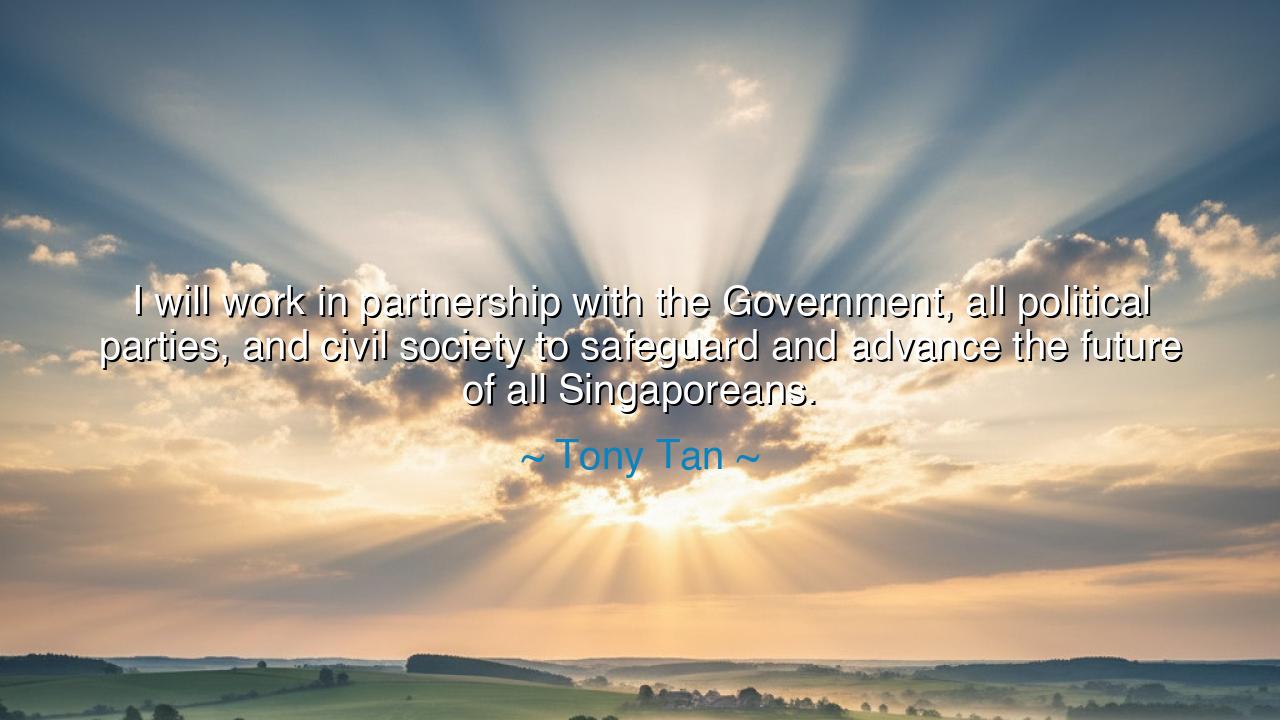
I will work in partnership with the Government, all political
I will work in partnership with the Government, all political parties, and civil society to safeguard and advance the future of all Singaporeans.






"I will work in partnership with the Government, all political parties, and civil society to safeguard and advance the future of all Singaporeans." These words, spoken by Tony Tan, resonate with a deep commitment to unity and collaboration for the common good. In this powerful declaration, Tan expresses a vision of a future where cooperation, rather than division, drives the progress of a nation. His statement is not merely a promise; it is a call to action, a call for the collective strength of government, political parties, and civil society to come together in the pursuit of a shared vision—a vision where the future of every citizen is safeguarded and advanced, not by any one group, but by the collective will of all.
In the ancient world, there was a similar understanding of the power of partnership for the common good. The Roman Republic was built on the idea that governance should not be the domain of a single ruler or party but the collaborative effort of elected officials and the people. The Senate and the people (SPQR) were the dual pillars of Roman governance, reflecting the belief that only through unified action could the Republic endure. The vision of the Republic was that leaders would work in partnership with the people to preserve the well-being of the state. Just as Tan speaks of partnership with various factions in Singapore, the Romans too understood that great achievements arise when all parts of society work toward a common goal.
Tan's quote draws attention to a central truth of governance: the future of a nation cannot be secured by the actions of any one individual or faction. The future of Singapore—like that of any nation—rests not in isolation, but in the interconnectedness of its people, its leaders, and its institutions. Civil society, represented by the people, must have a voice in shaping the future. The government and political parties must work together to craft policies that reflect the will of the people, ensuring that no one is left behind in the march toward a better tomorrow. Tan’s commitment is a reminder that true leadership is built on the foundation of collaboration, rather than division.
Consider the example of Nelson Mandela and the end of apartheid in South Africa. Mandela, after his release from prison, did not seek to impose his own vision of the future. Instead, he reached across political divides and embraced the power of partnership. Despite the long history of division and hatred, Mandela knew that to build a lasting and just nation, all sectors of society—the government, political parties, and civil society—had to work together. His reconciliation efforts helped to establish the Truth and Reconciliation Commission, which sought to heal the wounds of the past and build a future based on unity and shared responsibility. In the same way, Tan’s quote reflects a commitment to healing divisions and forging a path forward that brings all Singaporeans together for the common good.
The wisdom of Tan’s words is that in a world where division and conflict are often the easier path, unity is the true challenge—and the true strength. The work of the future cannot be accomplished by the will of the few or the strength of the many alone; it requires the alignment of all forces, the collaboration of all parties. In Singapore’s case, as in all nations, there must be a partnership between government, political parties, and civil society to ensure that the country’s future is secure. The lesson here is that division weakens, but unity strengthens, and only by joining forces across different sectors can a nation build a prosperous and just future.
The lesson that Tan imparts is one of humility and wisdom. True leadership does not seek to dominate, but to unite. It understands that the common good is always greater than the sum of individual interests. Tan’s words also carry an implicit reminder: no one can achieve true greatness alone. Whether in governance, business, or personal life, we must all seek to work together, recognizing that our strength comes not from acting in isolation, but from collaboration with others.
In our own lives, this calls us to build partnerships with those around us—whether in our families, communities, or workplaces. The future we seek to create depends on our ability to work together. It is easy to fall into the trap of thinking we must achieve success alone, but the truth is that the greatest achievements come from the strength of shared effort. Whether we are building a business, raising a family, or contributing to a community, the principles of collaboration, unity, and shared vision will lead us to the future we all hope to see.
Let us take Tan’s example to heart and remember that the future is not a destination we reach by one person’s journey, but a collective path we must walk together. Through partnership and cooperation, we can build a future that is exciting, prosperous, and inclusive—one where every voice is heard, and every person has a place in shaping what is to come.






AAdministratorAdministrator
Welcome, honored guests. Please leave a comment, we will respond soon